 Deep Sleep: What Is It and How to Measure and Optimize It
Deep Sleep: What Is It and How to Measure and Optimize It
Getting quality sleep is incredibly important for your daytime physical and mental energy levels, brain health, mental health, immune health, and overall wellness. It’s not enough to get 7 to 9 hours of sleep at night. You need quality sleep, which includes deep sleep. Deep sleep is a critical sleep stage characterized by slow eye movement and downstate with the slowest brain waves during the night. Deep sleep is essential for waking up refreshed and feeling energized during the day.
In this article, you will learn what deep sleep is. I will discuss the role of sleep in brain detoxification. You will understand the different sleep stages you go through each night and their importance. You will learn how to measure deep sleep with the Oura Ring sleep tracker. I will offer my top natural strategies for improving deep sleep to support your energy, brain detoxification, and overall health and wellness.
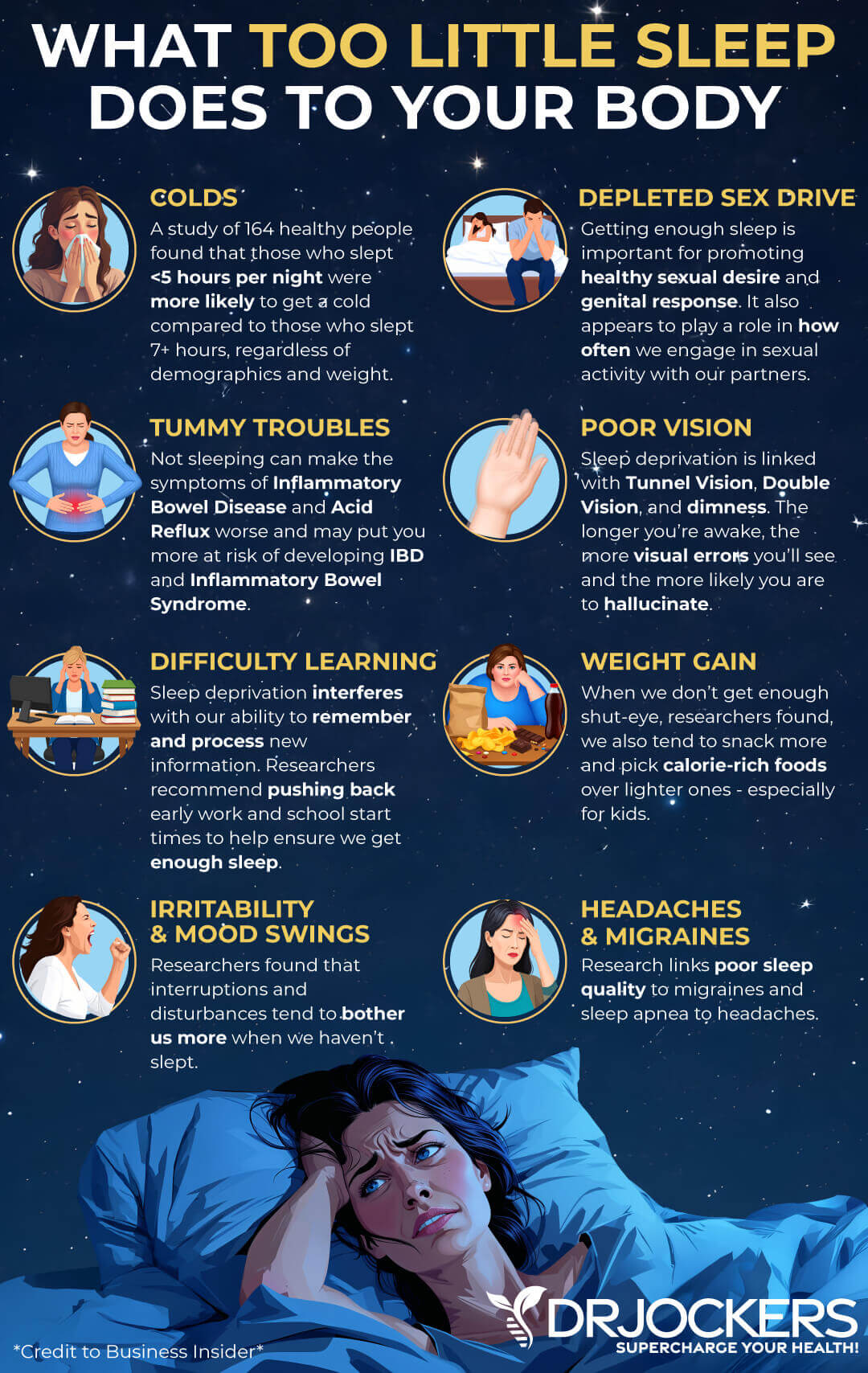
What Is Deep Sleep
Adults need about 7 to 9 hours of quality sleep every night. Deep sleep is a sleep stage that’s a very important part of this necessary, proper sleep. It’s also known as slow wave sleep (SWS) or delta sleep. It is the sleep stage where your body is experiencing the slowest brain waves.
Unlike Rapid Eye Movement (REM) sleep, deep sleep is characterized by slow eye movement and a downstate that allows your neocortical neurons to rest. Experiencing deep sleep each night is absolutely essential for waking up refreshed and feeling energized during the day (1, 2, 3).
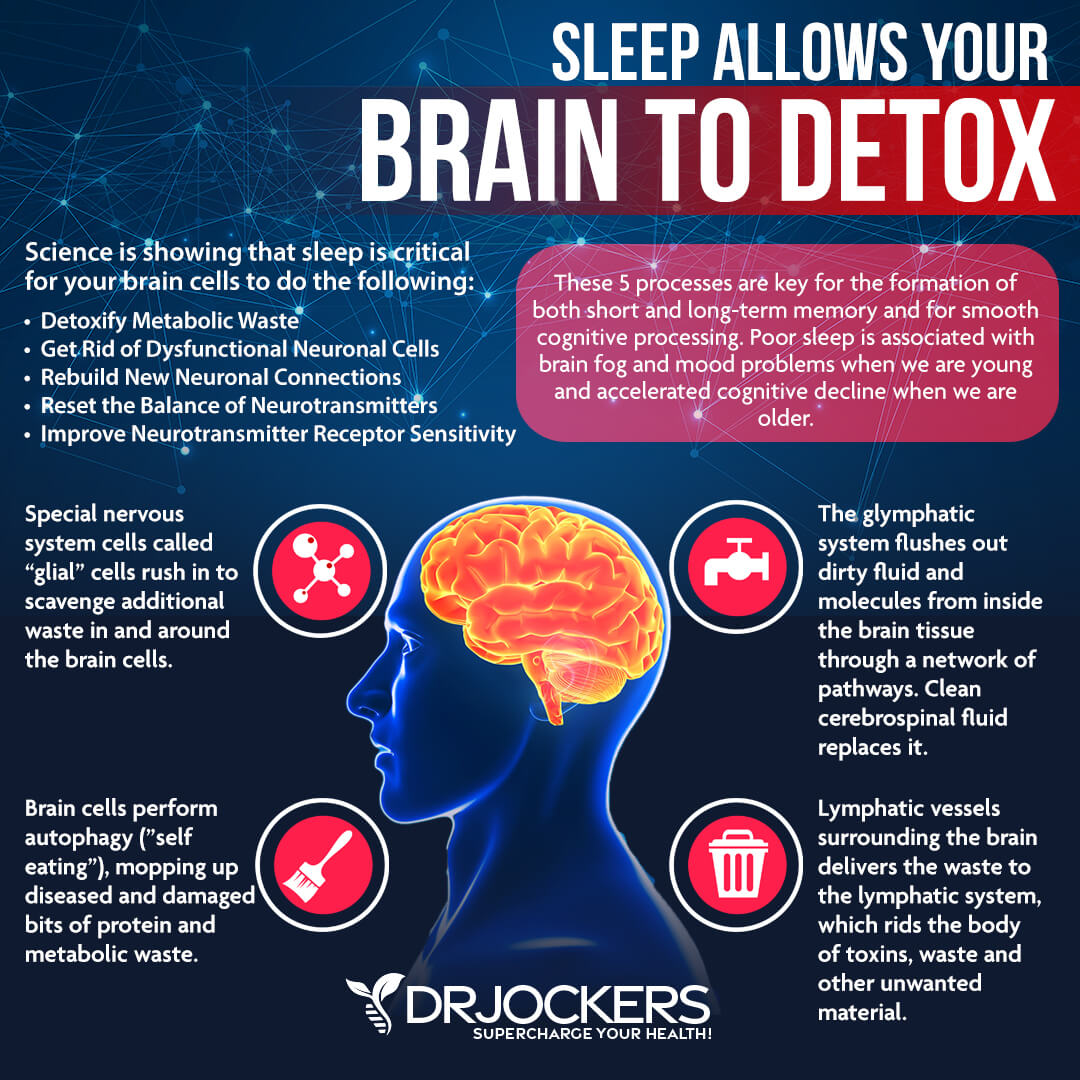
Sleep & Brain Detoxification
Sleep is not only important for rest and relaxation but also for brain detoxification and brain health. It may be surprising, but sleeping may literally help to clear your mind.
A 2013 study funded by the National Institute of Neurological Disorders and Stroke (NINDS) and published in Science has found that the space between your brain cells increase while you are sleeping (4). This space increase allows your brain to release toxin buildup from your wakeful times. As a result, sleep changes your brain’s cellular structure.
How does this happen? With the help of your glymphatic system, which is your body’s plumbing system. The term ‘glymphatic’ refers to your glial cells, which support, nourish, protect, and isolate your neurons and play an essential role in your immune and glymphatic system. Your glymphatic system allows the efficient removal of soluble proteins and metabolites from your CNS with the help of a system of perivascular tunnels.
Your glymphatic system also helps the brain-wide allocation of glucose, amino acids, lipids, neuromodulators, and growth factors. Since your glymphatic system mainly functions during your sleep and is mostly withdrawn during hours of wakefulness.
The study suggests that while you are sleeping, your glymphatic system opens up allowing better fluid flow through the brain. The glymphatic system also plays a role in controlling the flow of cerebrospinal fluid (CSF) around your brain and spinal cord.
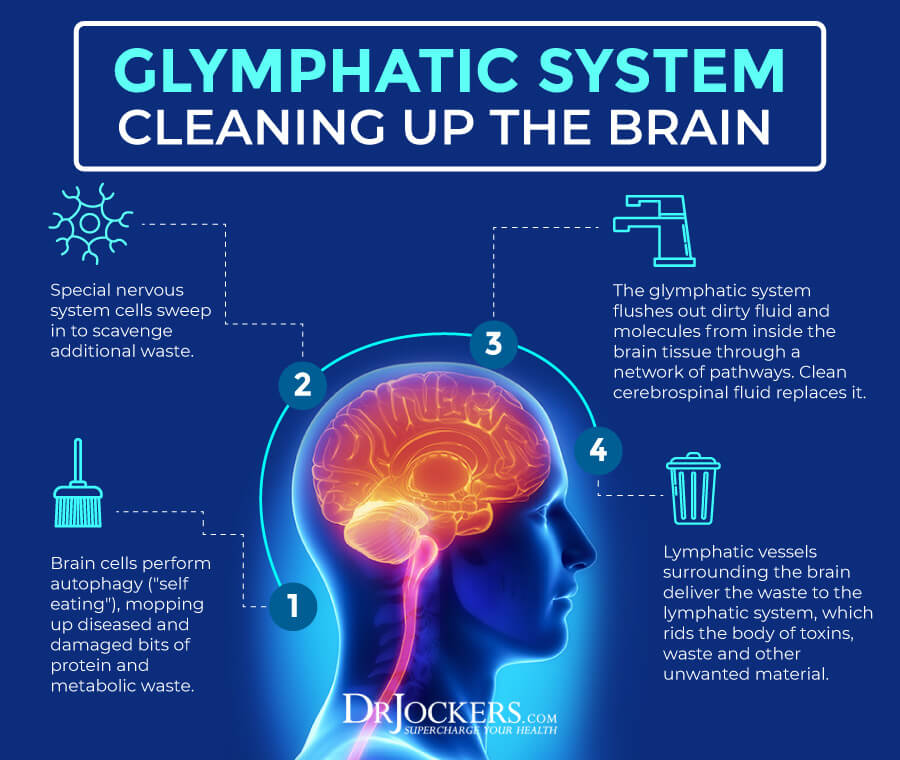
How The Glymphatic System Works
A 2015 study published in Neurochemical Research has also found that the glymphatic system is a waste collector that picks up toxins and waste in your brain and nervous system (5). Your glymphatic system works best during less active periods, especially during sleep, making sleep the perfect time for brain detoxification.
The way this works is rather complicated, but to better understand it, we can break it down into three steps. First, cerebrospinal fluid fills off your glymphatic system. This fluid serves as a garbage collector of toxins, proteins, and other waste products flowing in the system. Since keeping garbage in your system is not a good idea, your brain releases this waste at different drainage sites where it can leave your body along with other types of waste products.
One of the most important waste products that your glymphatic system helps to remove the beta-amyloid proteins. According to the Alzheimer’s Association, beta amyloid proteins plays a role in the development of Alzheimer’s disease (6).
Supporting the glymphatic system and getting good sleep, therefore, is very important in reducing your risk of Alzheimer’s by detoxifying beta-amyloid proteins. You can learn more about the glymphatic system and its brain health benefits by reading this article.
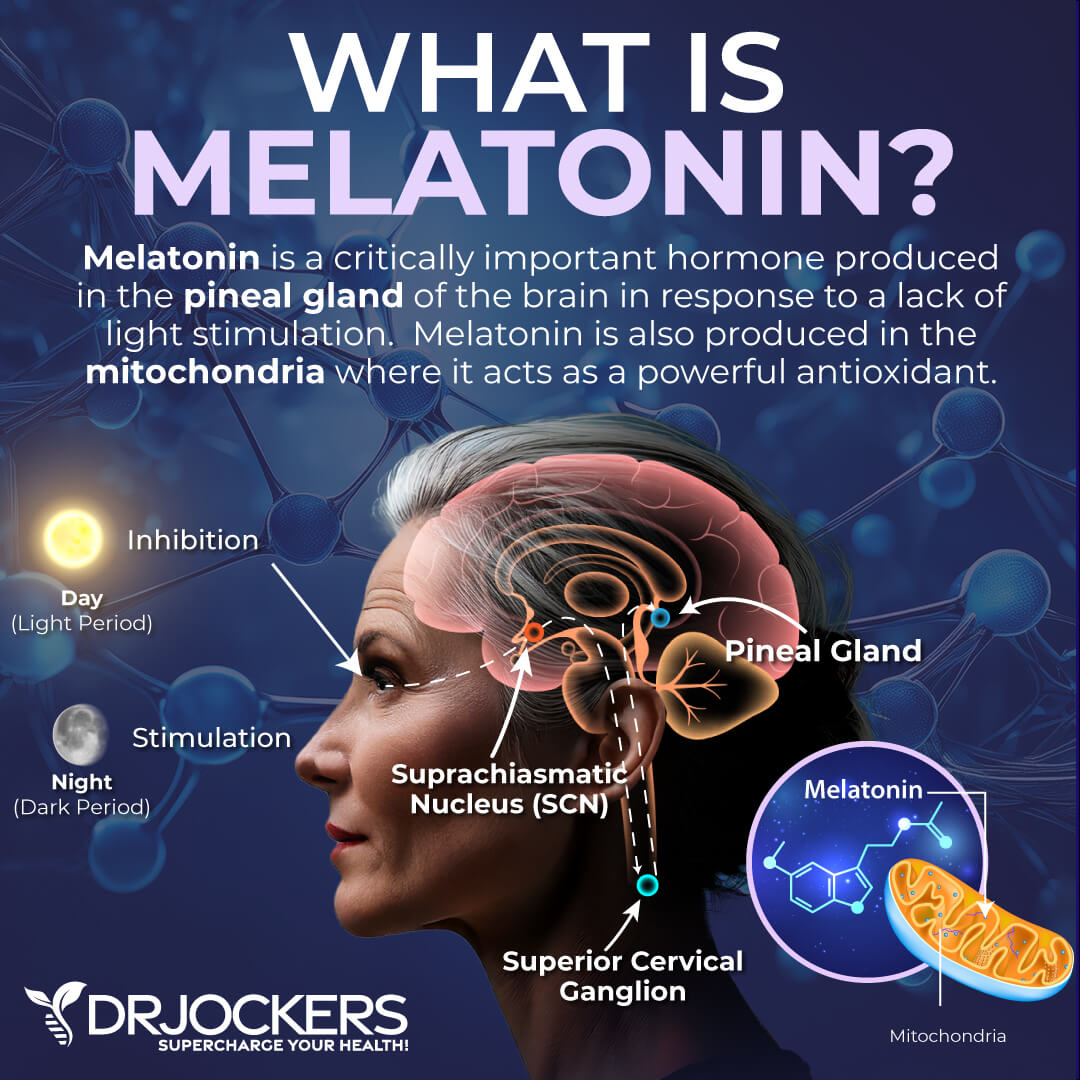
The Importance of Melatonin
Another important aspect of brain detoxification beyond your glymphatic system is melatonin. Melatonin is a nutrient that’s important for a healthy sleep-wake cycle. It is often used as a supplement for insomnia, jetlag, and improving other sleep problems. It is also a powerful brain detoxification agent.
Melatonin helps to clean environmental toxins and other pathogens from your brain. A 2010 study published in Current Neuropharmacology has found that melatonin helps to inhibit pro-inflammatory cytokines, offers antioxidant support, and reduces inflammation, oxidative stress, and infections (7). As a result, it may be a powerful protective agent for traumatic brain injury (TBI) patients reducing inflammation and infections.
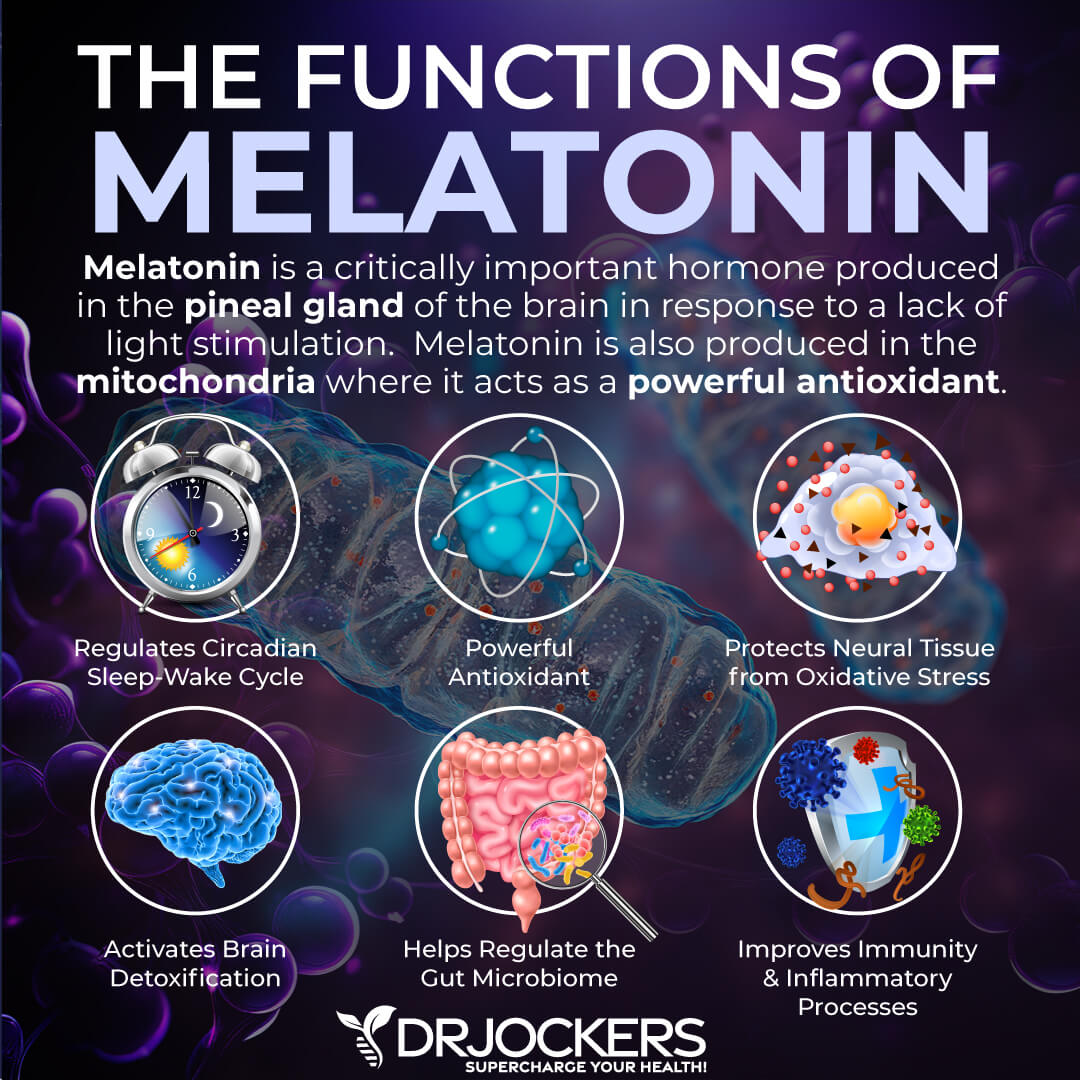
Melatonin and Circadian Rhythm:
A 2019 study published in Death and Disease has also found that melatonin helps to reduce inflammation (8). A 2010 study published in Current Neuropharmacology has found that melatonin deficiency plays a role in oxidative stress and age-related neurodegeneration (9).
Another 2010 study published in Current Neuropharmacology has found that because melatonin can cross the blood-brain barrier, it can effectively fight neurotoxin agents that may also pass this barrier (10). It stimulates antioxidative enzymes, fights free radical damage, and helps to reduce neurotoxins at the mitochondrial level. As a result, melatonin not only supports your sleep but helps to protect your brain and neurological health.
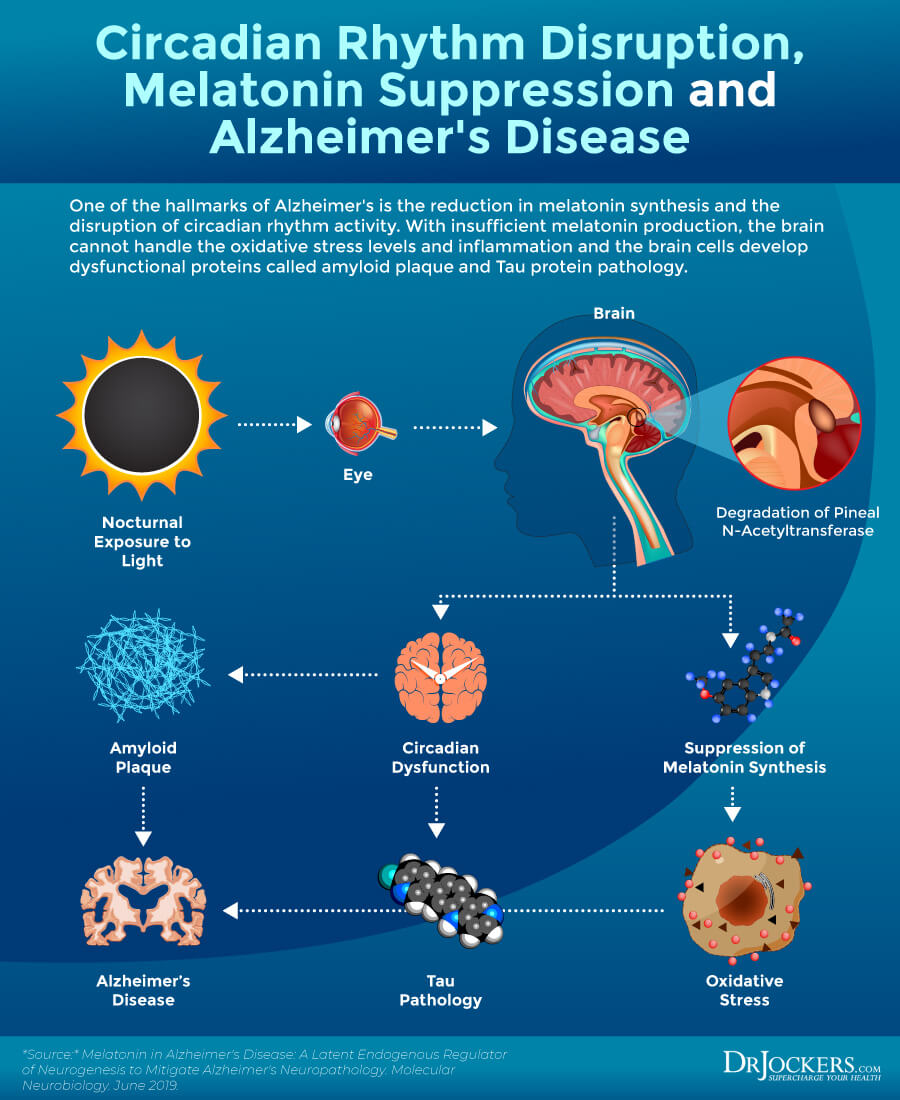
Stages of Sleep
Your sleep is divided into REM and non-REM sleep. You start your sleep cycle with non-REM sleep, followed by a shorter REM sleep period. You go through this rotation cycle every 90 minutes at night. Deep sleep happens at the very end of the non-REM sleep period.
Non-REM Sleep
After wakefulness, your body slowly goes into non-REM sleep, starting at stage 1.
Stage 1
Non-REM sleep starts with stage 1 as you are moving from awake to being asleep. It lasts for a few minutes. During this stage, your heartbeat, eye movements, respiration, and other body functions start to slow down. Your muscles start to relax though they may also twitch occasionally. Finally, your brain waves begin to slow down and relax into a sleepy state (1, 2, 3).
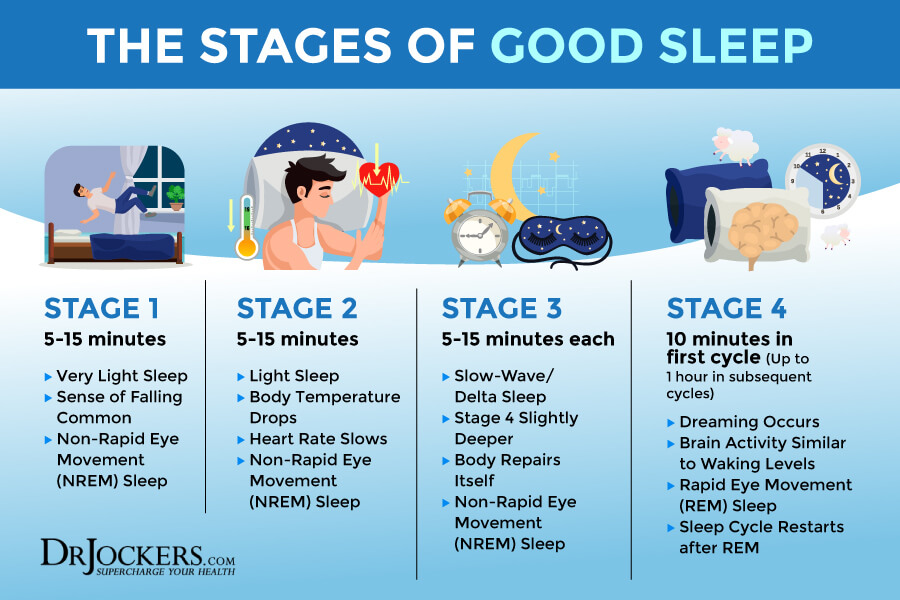
Stage 2
After stage 1, you enter into stage 2 of your non-REM sleep cycle. This accounts for about 50 percent of your entire sleep cycle, and you experience it several times throughout the night. During stage 2, your body and functions continually relax and slow down more. Your eye movements stop, your temperature drops, and your brain waves slow down even more, except for a couple of short burst activities (1, 2, 3).
Stage 3 & 4: Deep Sleep
After stage 2, you enter stages 3 and 4. These are the stages for deep sleep. Your heartbeat and breathing become very slow. Your muscles relax. Your brain waves become the slowest they will be during your sleep. Waking up from deep sleep is very difficult. Your first deep sleep cycle may last for 45 to 90 minutes. Each cycle becomes shorter as the night progresses (1, 2, 3).
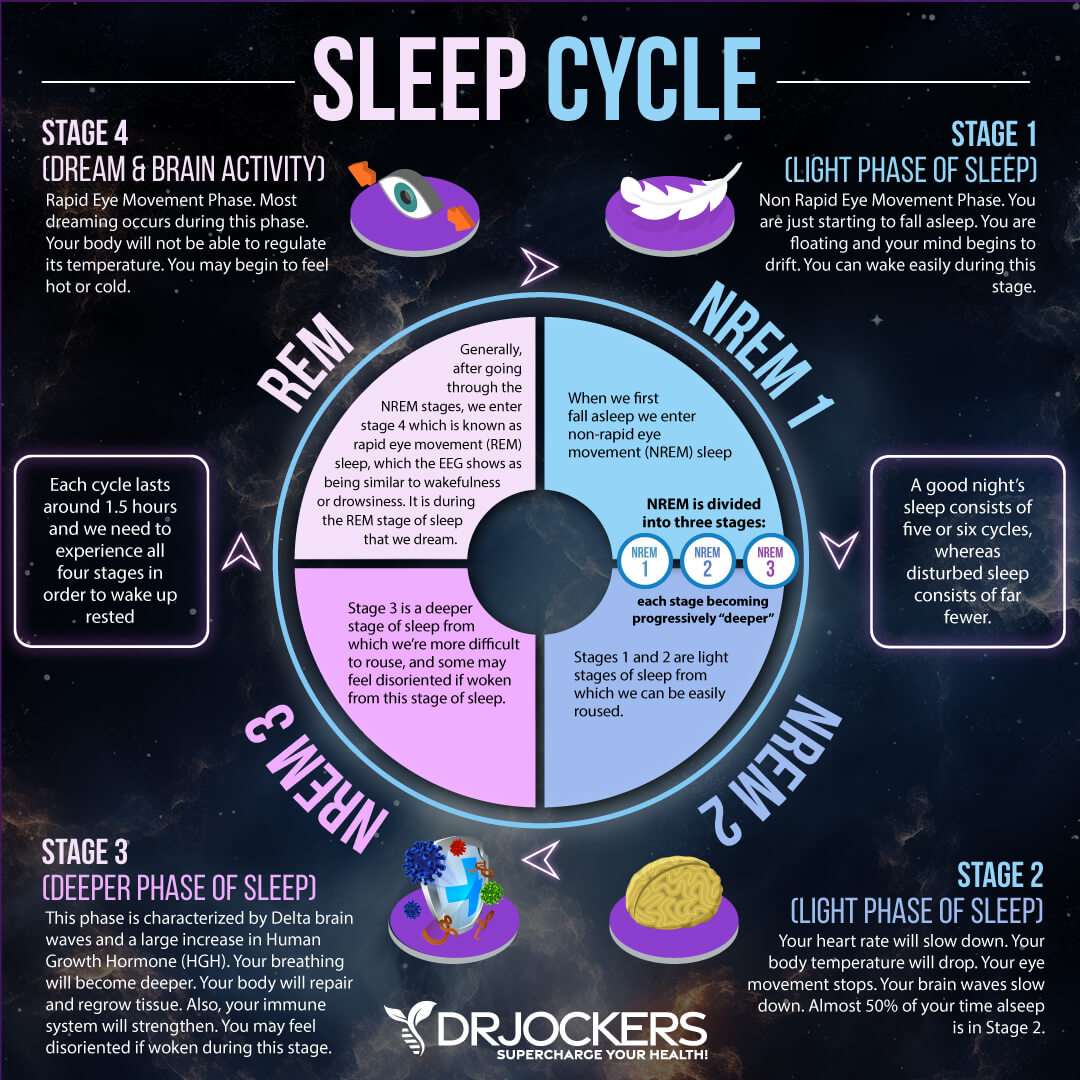
REM Sleep
REM sleep is also known as stage 5 of your sleep cycle after you go through the non-REM sleep stages. During this stage, your brain activity increases. Your body is more awake. You will likely experience dreams.
Your eyes move rapidly from side to side, while your heart rate and breathing become faster. Your limbs, on the other hand, become harder and even paralyzed (1, 2, 3).
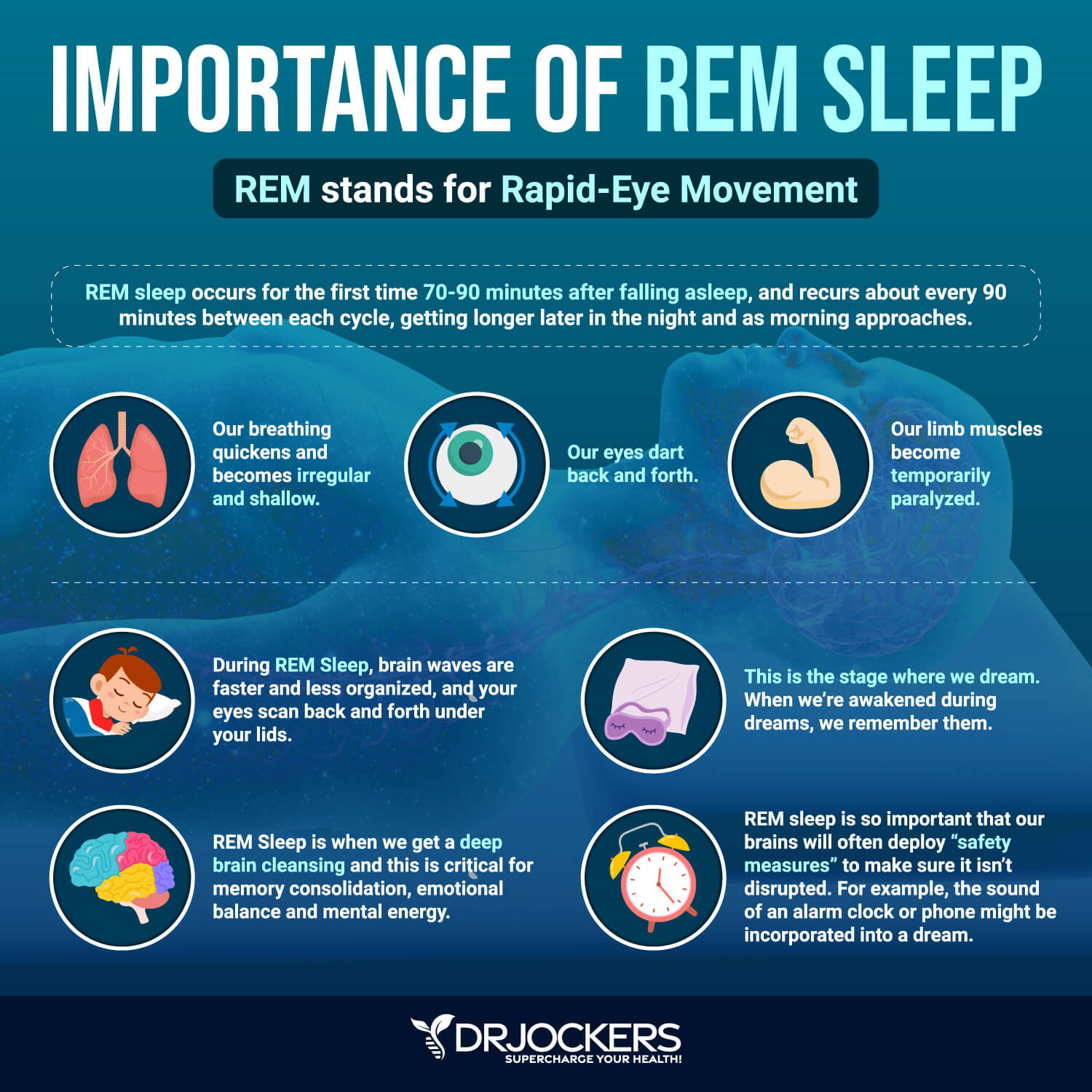
Measuring Deep Sleep with Oura Ring
The best way to measure your deep sleep is with a sleep tracking technology like the Oura Ring. Sleep tracking is an increasingly popular technology that can track your:
- Sleep duration: They track the period that you are inactive when you fall asleep and wake up in the morning.
- Sleep quality: They track interrupted sleep and show you how much you’ve tossed and turned during your sleep.
- Sleep phases: They track how deep you’ve slept, when and for how long you’ve achieved different sleep phases, and if you’ve experienced REM sleep. This is the function that you need to check your deep sleep.
- Environmental factors: They track the light in your bedroom or temperature that may affect your sleep.
- Lifestyle factors: In some trackers, you may enter information about your daily activities that may affect your sleep, including your diet, exercise, or stress levels.
There are a variety of wearable trackers on the market. Most of them are strap-on you wear on your wrist similar to a watch. Other trackers can be placed by your pillow or on your bedside table. There is one sleep tracker I particularly love, personally use, and recommend, though. It is the Oura Ring. Yes, it’s a small ring that looks like you are wearing a regular ring. Nobody will know that you are wearing a sleep tracker. Since it wraps around your finger precisely, it is incredibly accurate and more detailed than most other trackers
It is more than just a sleep tracker. The Oura Ring tracks your body and activities all day and night, 24/7, for more accurate and insightful baseline information to help you gain a deeper understanding of your sleep and improve the quality of your sleep. It tracks your body temperature indicating your baseline, any variations that may affect your sleep, menstrual cycle changes in women, and early signs of illness.
It tracks your resting heart rate and respiratory rate. It even tracks blood volume pulse directly from the palmar arteries which help to track your sleep cycle, including light sleep, deep sleep, REM sleep, heart rate variability and hours spent awake.
Tracking your sleep may give you important information that will help you determine what changes you need to make for better sleep and better health. It lets you know when your body needs more rest and time to recharge. It detects active and inactive periods during the day, helping you to increase or decrease your daytime activity and exercise as needed to support your sleep and overall health. It can track your daily steps and calories to track your goals and measure your progress.
The Oura Ring is much more than just a sleep tracker. It is a health, fitness, and sleep tracker. It is stylish, simple, accurate, and detailed. It is easy to use and allows you to import and export your information quickly. I highly recommend it in order to obtain precise information about your sleep and to improve your health with the help of accurate personal data. You may learn more about sleep tracking and the Oura Ring by reading this article.
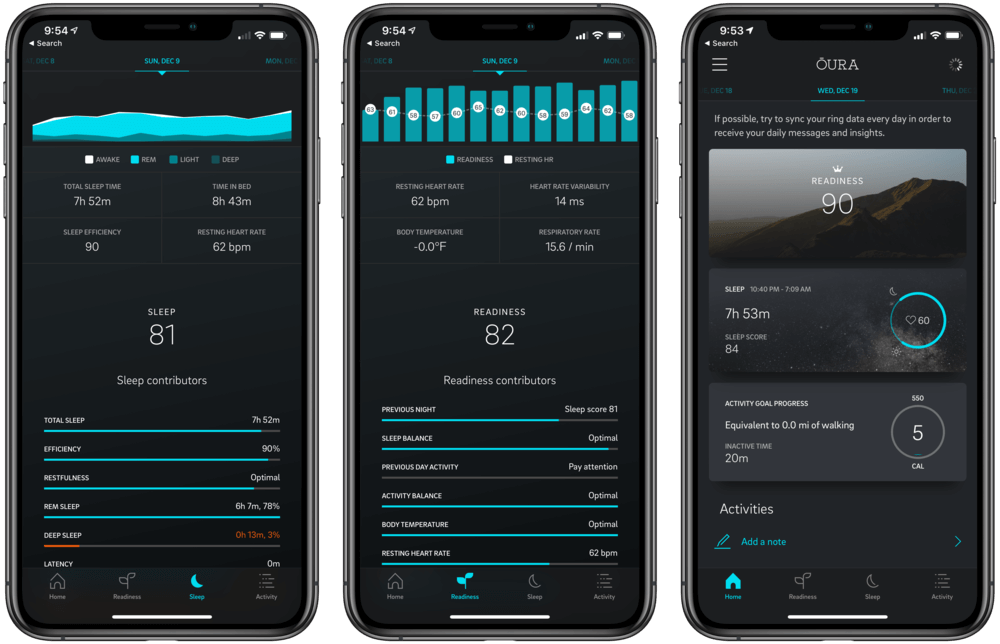
What is Heart Rate Variability?
Heart rate variability (HRV) is the measure of the time variation between your heartbeats. This variation is controlled by your autonomic nervous system (ANS). Your ANS regulates your heart rate, blood pressure, breathing, digestion, and other areas of life.
Through the ANS, your hypothalamus sends important information to different parts of your body. It sends signals to induce rest and relaxation. At night, it helps you to fall and stay asleep. However, if you are leading an unhealthy lifestyle, eating a poor diet, stressed out and not exercising enough, or if other factors are involved that may affect your sleep, then your hypothalamus and ANS will have a more difficult job helping you sleep.
Tracking your HRV is a simple, noninvasive, and a fascinating way to check ANS imbalances. When your HRV is low, it means that your body is stressed and in fight-or-flight mode, whereas, higher HRV means a more relaxed and healthier state. Low HRV may be associated with depression, anxiety, health issues, or even the risk of cardiovascular disease or death.
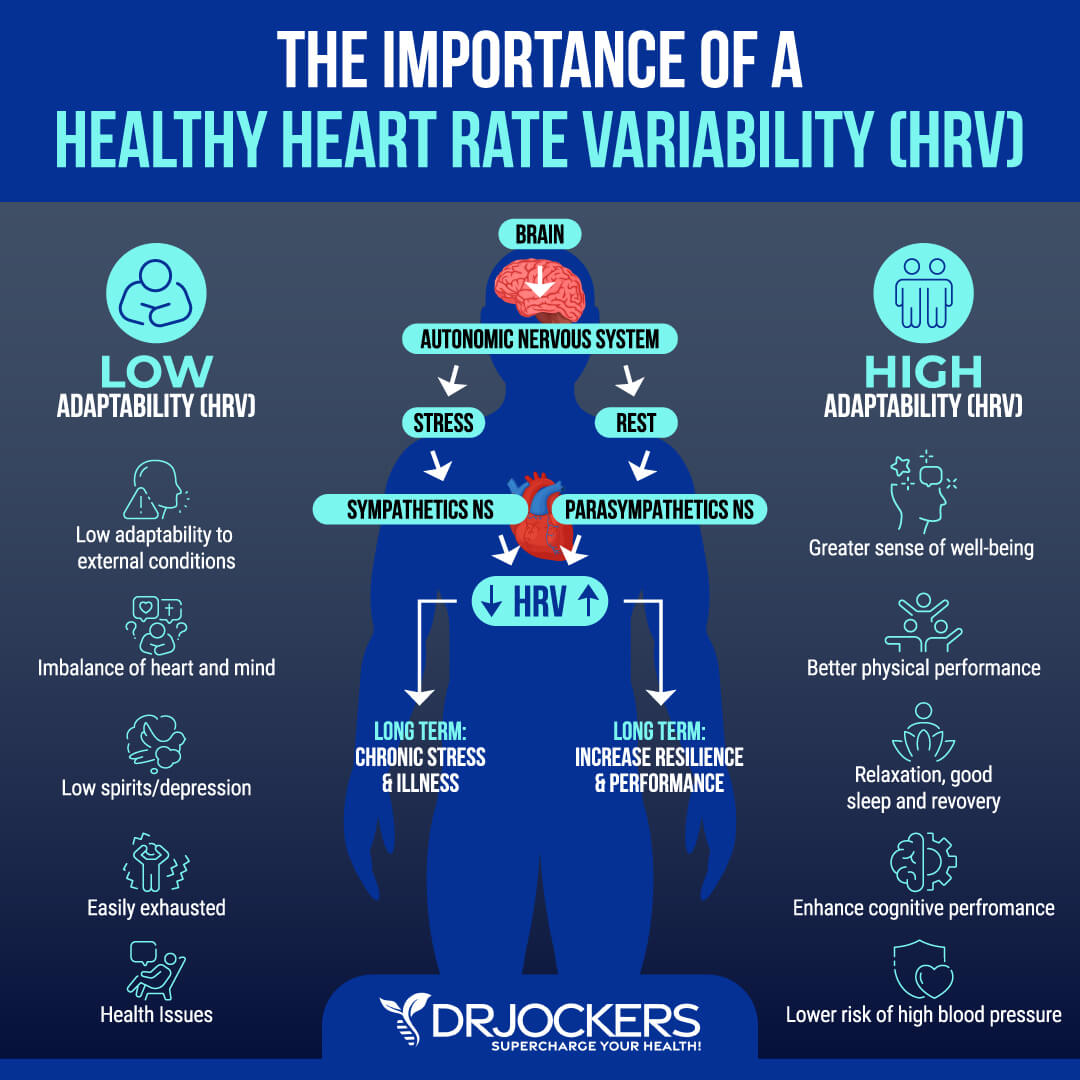
Improving Deep Sleep
Improving your deep sleep is important for brain detoxification, cognitive and neurological health, reduced inflammation, cellular rejuvenation, immune health, daytime energy, and overall health and wellness. Here is what I recommend for improving deep sleep naturally:
Good Sleep Habits
It’s a no-brainer that developing good sleep habits supports deep sleep. One of the most effective ways you can support healthy sleep is going to be at the same time each night and waking up around the same time.
A 2016 review published in Sleep has found that going to sleep and waking up around the same time supports your body’s circadian rhythm, or natural wake-sleep cycle (11). Researchers have found that shift workers who have more day-to-day changes in their sleep cycle experience more disturbed sleep and, as a result, also have an increased risk of obesity, insulin resistance, metabolic syndrome, and type 2 diabetes.
The review also discussed that waking up and starting the day too early may mean that people are awake during their biological night, shortening their sleep, interrupting their body’s sleep-wake cycle, and reducing insulin sensitivity. Researchers recommend starting school and work no earlier than 8:30 ideally to support a healthy sleep schedule more in tune with your body’s natural needs.
Other than going to bed and waking up around the same time every day, developing a good evening routine can help. Avoid stress, heavy foods, sugar, and alcohol later in the evening at night. Use blue light blocking glasses in the evening and aim to avoid all electronics at least 2 hours before bedtime.
There’s a vast body of research which shows artificial blue light causes a wide range of adverse health effects including insomnia, retinal degeneration and depression. So, if you’re looking to protect and maintain your health, sleep and vitality, one of the easiest ways to do so is with blue light blocking glasses.
Unlike most other so-called blue light eyewear on the market, Swanwick has multiple independent studies validating their effectiveness, including from the University of Washington and Indiana University.
They also publish their lens transmission data, which means you know exactly what you’re getting: a sturdy, stylish, and EFFECTIVE sleep and work aid.
—>Click Here to Learn More About the Swanwick Blue Light Blocking Glasses!
**And for a limited time, you can get 15% off all your Swanwick products by using the code JOCKERS15 at checkout.
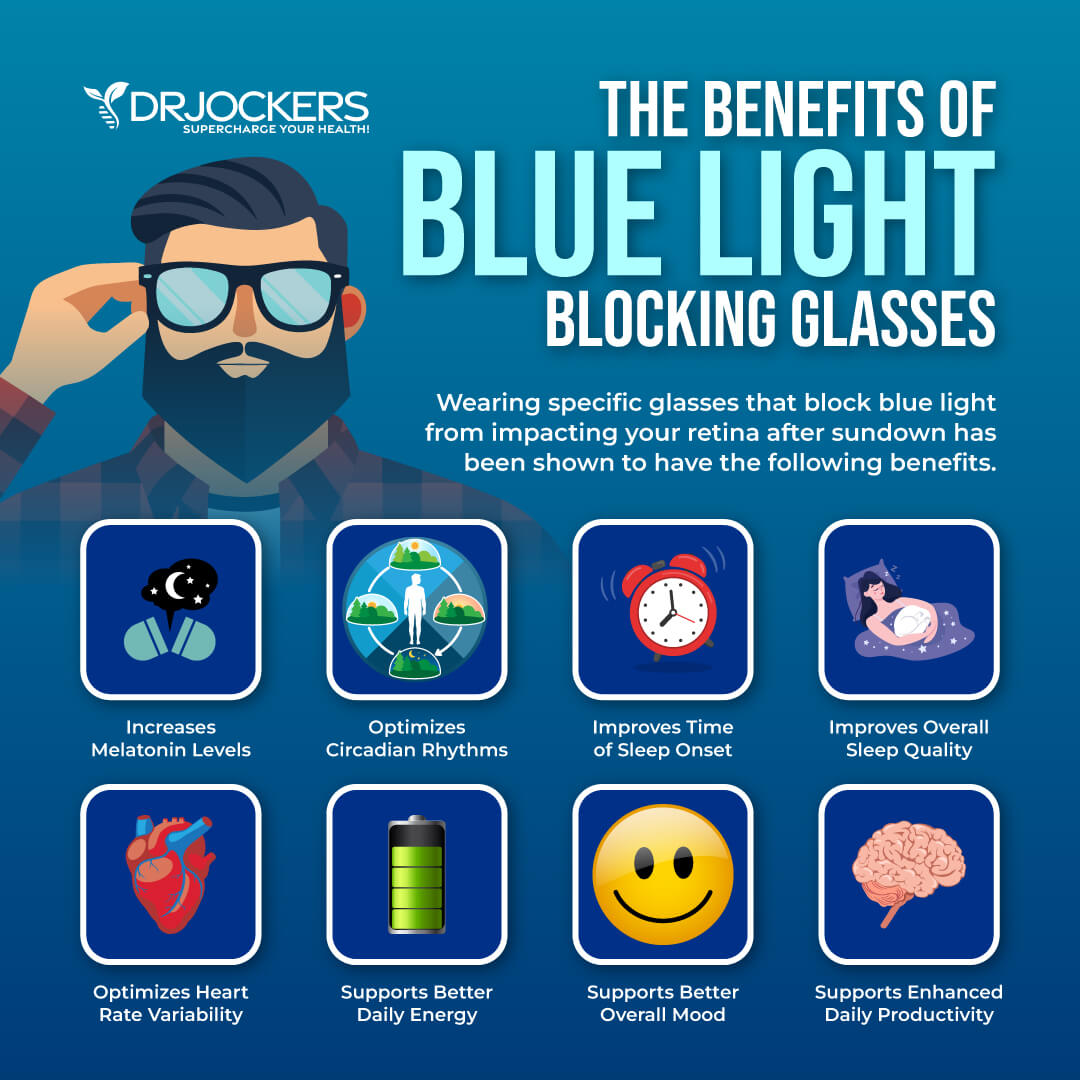
I recommend that you choose relaxing and offline activities instead, such as conversations with your family, board games, crossword puzzles, coloring, journaling, reading fiction or poetry, gratitude journaling, taking a healing bath, daily reflections, prayer, or spiritual practices.
Create a peaceful sanctuary in your bedroom that supports rest and relaxation. You may want to try some calming essential oils, like lavender or chamomile oil, using a salt lamp, and adding some calming decorations. Invest in a supportive bed, mattress, bedding, and pillows. I recommend using a blackout curtain and/or eye pillows to create darkness.
Don’t keep your room too warm. Most people sleep at around 65F or 18C. This may vary from person to person by a few degrees, so find what’s the most comfortable for you. Remember, your sleep tracker can always help to figure out the quality of your sleep at different temperatures.

Reduce Stress & Practice Gratitude
A 2007 review published in Behavioral Sleep Medicine has found that stress can decrease deep sleep, REM sleep, and sleep efficiency (12). It can also increase wakefulness and awakenings during the night. Decreasing your stress levels is clearly important for better sleep and deep sleep.
Practicing gratitude is one of the best ways to decrease chronic stress and improve your sleep. You cannot be stressed, sad, or angry in a state of gratitude. Upon waking, recount your blessings in your mind. Be thankful for your family, friends, a roof over your head, food on the table, your body for doing its best, and for a new day ahead.
Stop throughout the day to notice the small things and feel gratitude. You can even set your phone or stopwatch for moments of gratitude.
Keep a gratitude journal and write down three things you are grateful for in the evening. Challenge yourself to pick three new things every day of the month. Make sure to feel gratitude instead of just thinking about it or writing it down.
Beyond gratitude, practicing meditation, breathwork, guided relaxation, and visualization can reduce chronic stress and help you respond to stress better. Reading scripture, journaling, positive affirmations, mindset shifts, and prayer also help to achieve more calm, peace and relaxation. Grounding and spending time in nature are some other great ways to reduce stress, induce relaxation and calm, and support deep sleep at night.
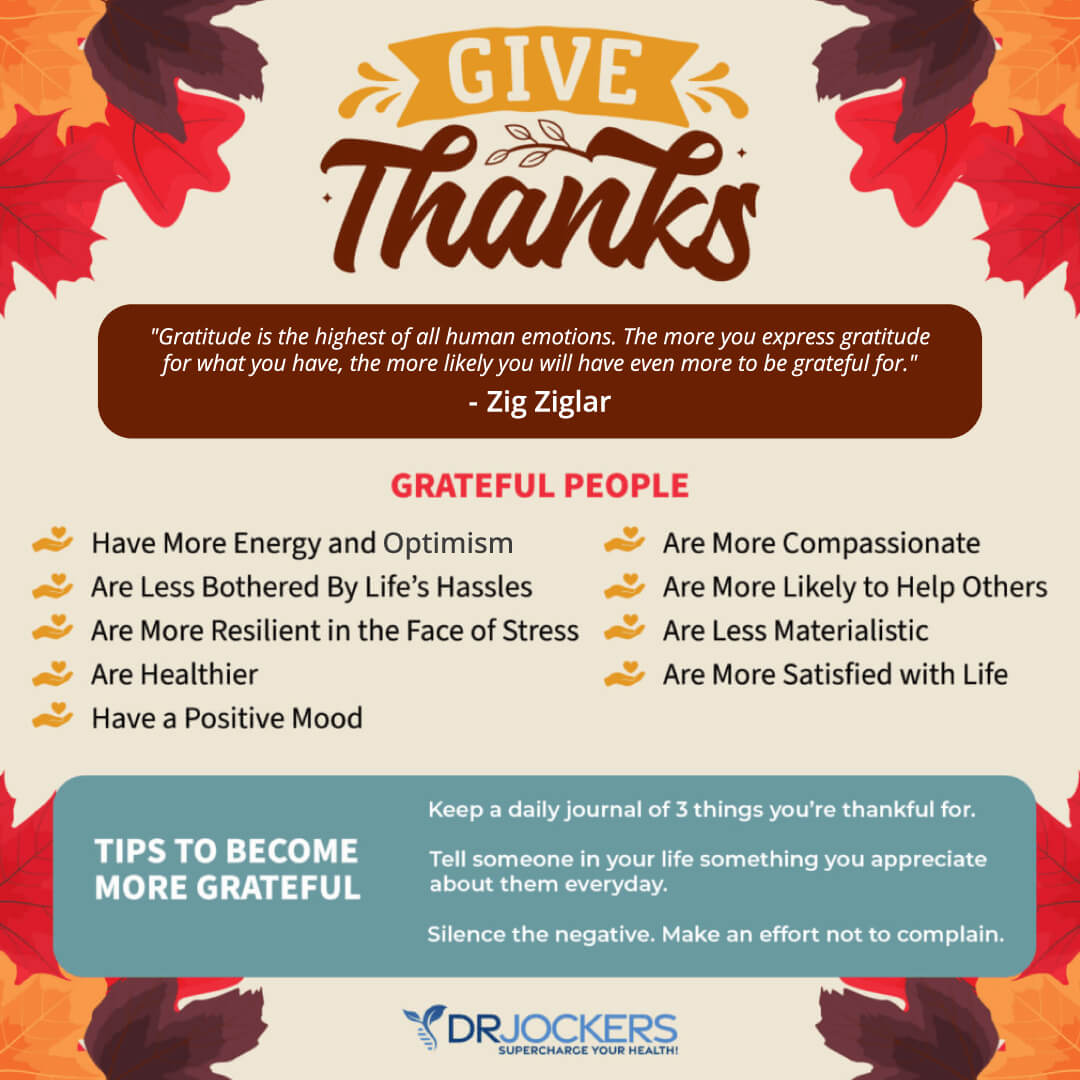
Get Sunlight During the Day
A 2020 cross-sectional study published in Science Reports has found that reduced sun exposure during the day and vitamin D deficiency can affect sleep duration and sleep quality (13). Reduced sunlight during the day can also interfere with your circadian rhythms and sleep cycle.
I recommend that you get some sunlight during the day. Open up the curtains and let the sunshine in. Take a walk outside and exercise outdoors. Sit out during the day to enjoy a cup of tea, eat lunch, or read a book. Even during the colder months, it’s important that you get some sunshine as long as it’s out and get as much sunlight as possible.
During the colder and darker months, when you may not be getting enough sunlight, you may want to try a light therapy lamp to avoid seasonal depression (SAD) and support your sleep. To optimize your vitamin D levels, I recommend going beyond just daily sunshine and supplementing with vitamin D3 as well.
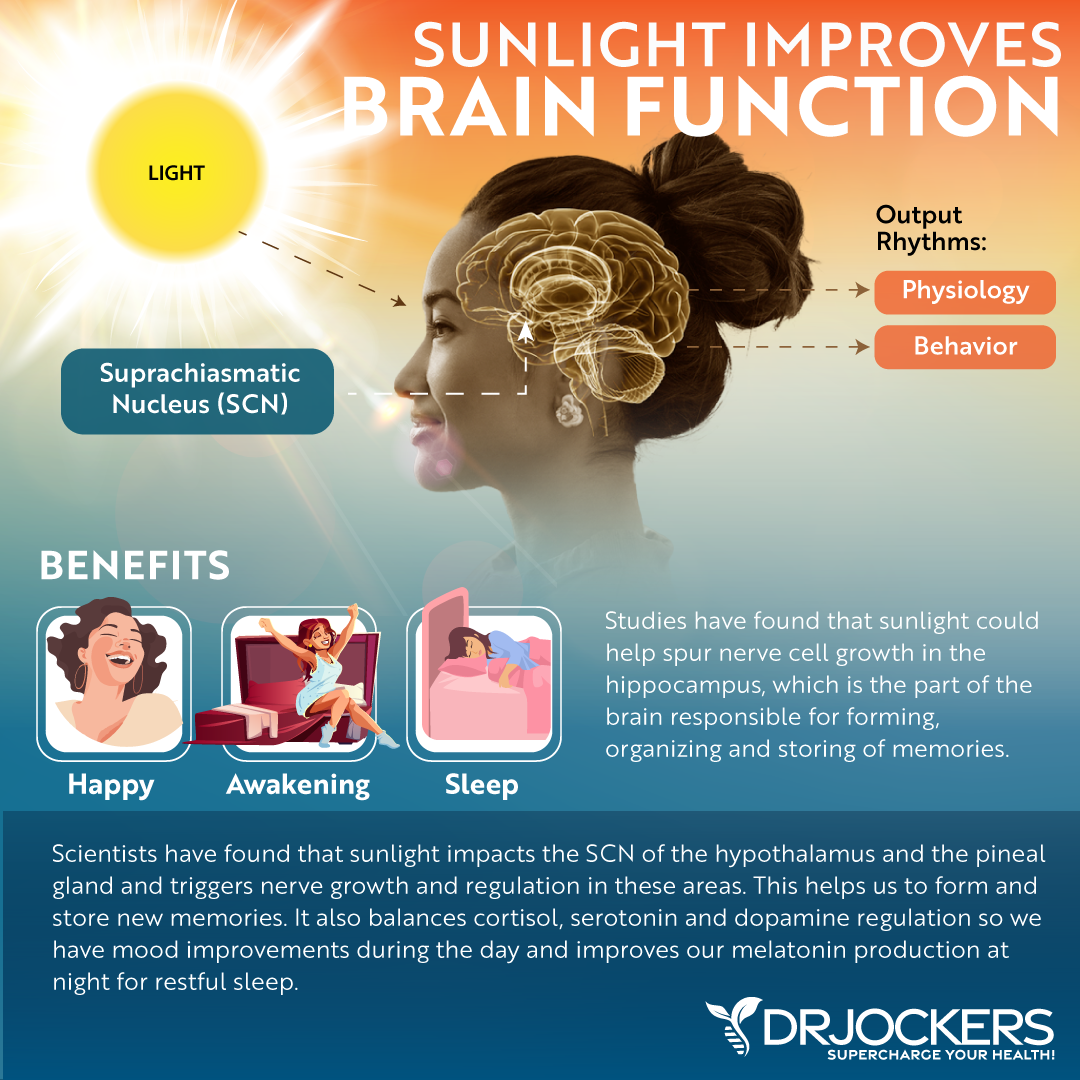
Regular Movement & Exercise
A 2017 systematic review published in Advances in Preventive Medicine has found that regular exercise can support your sleep (14). I recommend that you move your body regularly throughout the day. Start your day with some stretching, yoga, or a light walk. Get up and stretch regularly throughout the day.
Take a walk during lunch or in the evening. Try a mini dance session or quick trampoline session. Ride your bike instead of driving.
Exercise at least five times a week. Try a mix of strength and resistance training, such as weightlifting, kettlebell workouts, resistance bands, bodyweight workouts, or CrossFit, cardiovascular exercises, such as jogging, biking, dancing, aerobics classes, or swimming, and low-impact workouts, such as yoga, Pilates, barre workouts, or TaiChi. However, do not within 3 hours before sleep. It can stimulate your mind and body and make sleep more difficult.
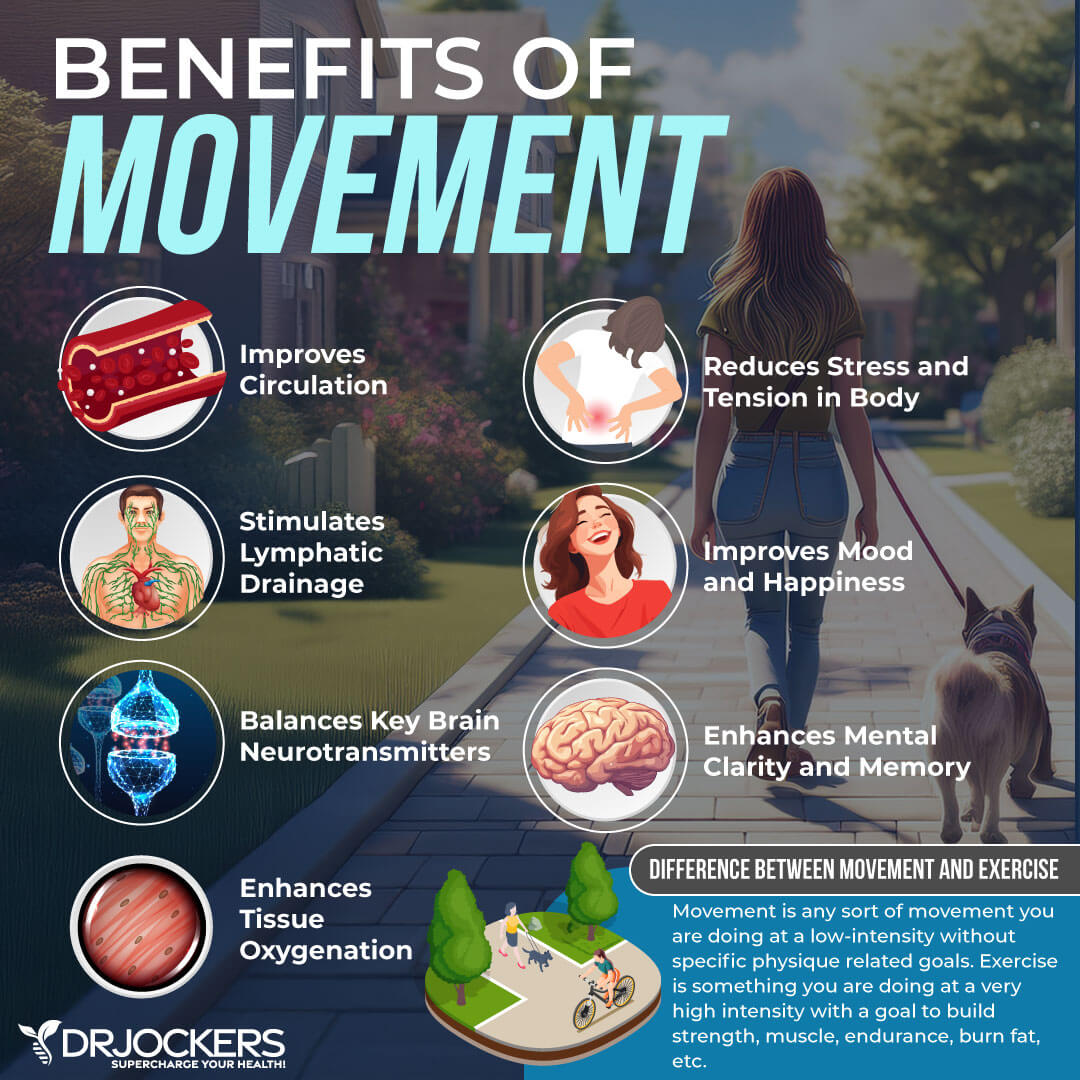
Reduce Blue Light Exposure at Night
According to a 2009 study published in Trends in Cognitive Sciences, blue light exposure stimulates the brain, increases alertness, and increases your heart rate which can interfere with your sleep (15). Reducing your blue light exposure at night is critical for supporting your sleep cycle and deep sleep.
I recommend that you dim your light in the evening. I recommend using specific light dimming night bulbs like this. To reduce blue light exposure from your computer, laptop, tablet, phone, and other electronics, I recommend using blue light blocking glasses. Even if you are using these blue light blocking glasses, it’s important that you turn off your electronics at least two hours before sleep, reduce stimulation, relax, and unwind your body and mind.
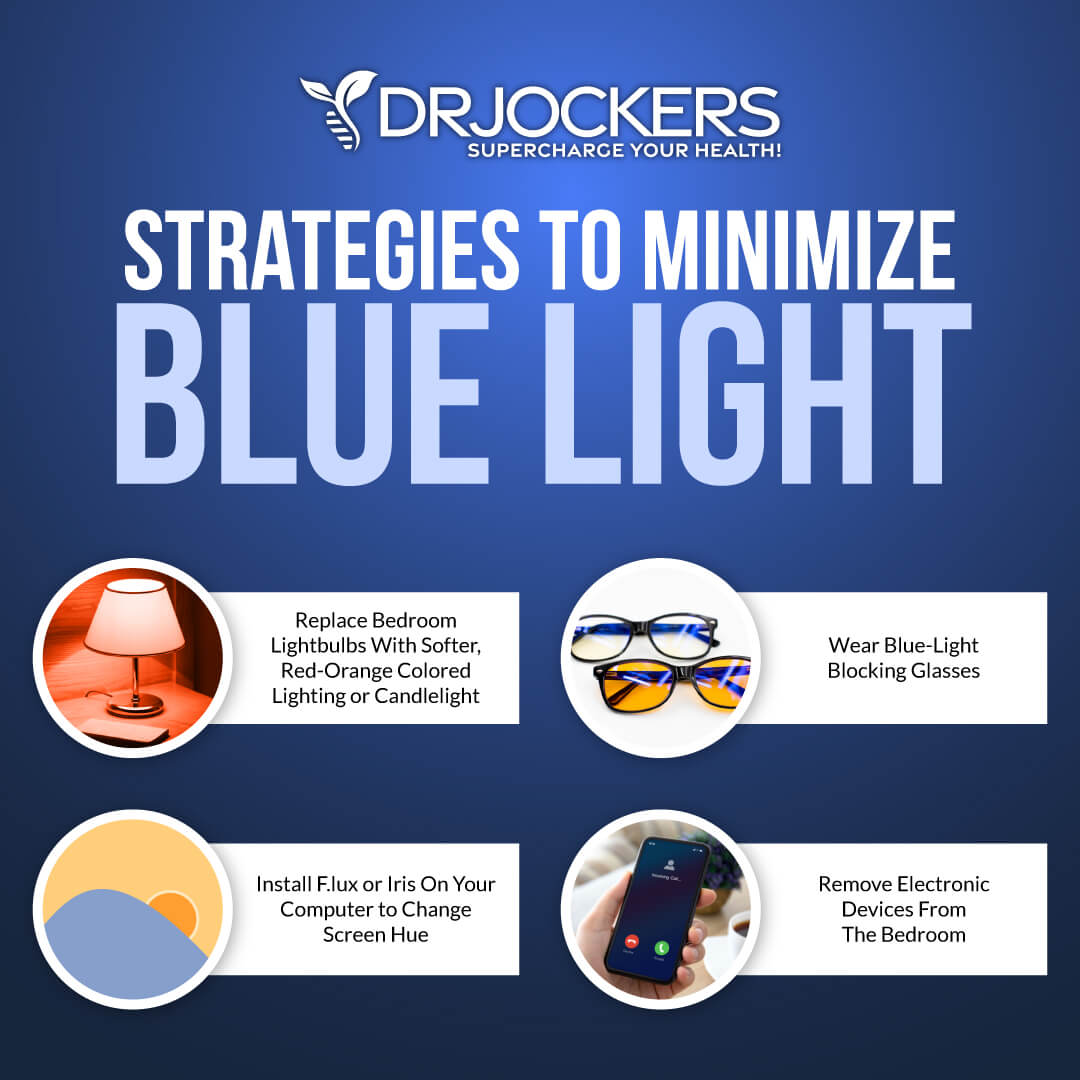
Blackout Your Room
A 2011 study published in the Journal of Clinical Endocrinology and Metabolism has found that being in a fully lit room close to bedtime can suppress melatonin production and duration and interfere with sleep (16). This is why I recommend dimming light night bulbs. Sleeping in a lighter room can also interfere with melatonin production and your circadian rhythms. It may also be more stimulating and keep you awake.
I recommend blacking out your room with the help of a good blackout curtain and closing your door. I also recommend that you use an eye mask. Using an eye mask is particularly important if you are traveling and sleeping outside of your home without being able to control the curtains and the darkness of the room.
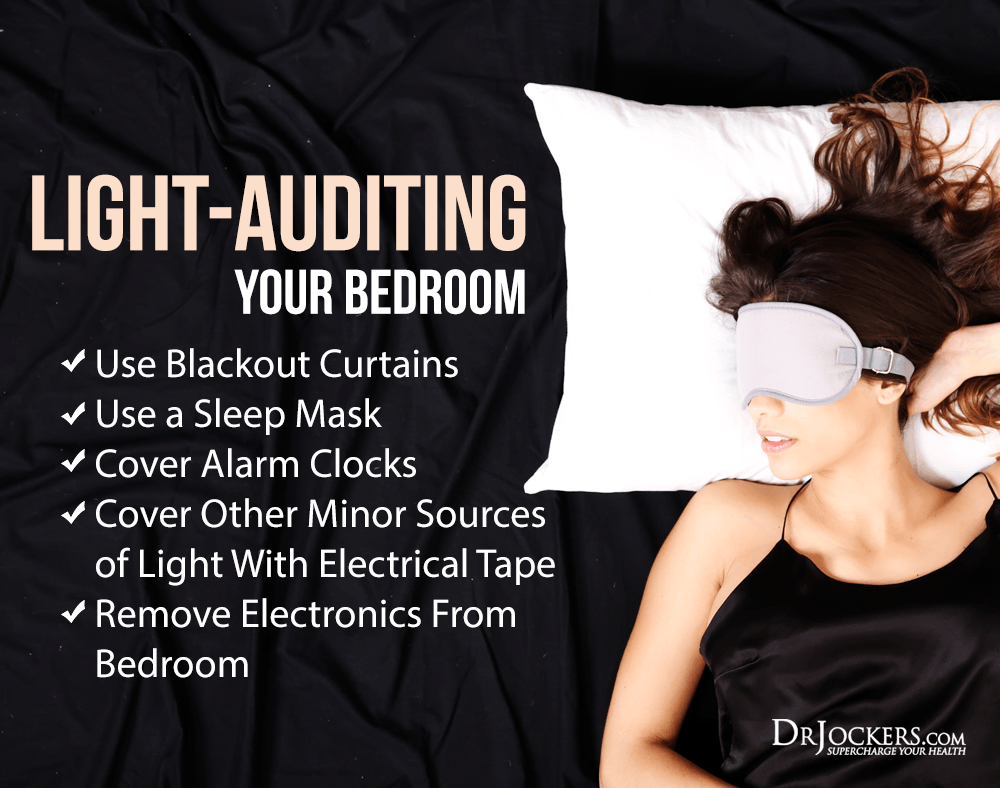
Balance Your Blood Sugar
A 2005 review published in the Journal of Applied Physiology has found that poor sleep can increase the risk of insulin resistance, blood sugar issues, and type 2 diabetes (17). On the other hand, blood sugar imbalances can interfere with stable energy during the day and natural tiredness at night.
Blood sugar imbalances can cause sugar crashes, quick bursts of energy, insomnia, and disrupted sleep. A 2020 study by the National Heart, Lung, and Blood Institute (NHLBI) published in the Journal of the American Heart Association has found an association between high blood sugar and sleep apnea (18).
To keep our blood sugar levels stable, I recommend following an anti-inflammatory diet low in sugar and carbs and high in healthy fats. I recommend eating lots of greens, vegetables, herbs, spices, fermented foods, grass-fed butter and ghee, grass-fed beef, pasture-raised poultry and eggs, wild-caught fish, and wild game. You may learn more about the ketogenic diet I recommend in this article.
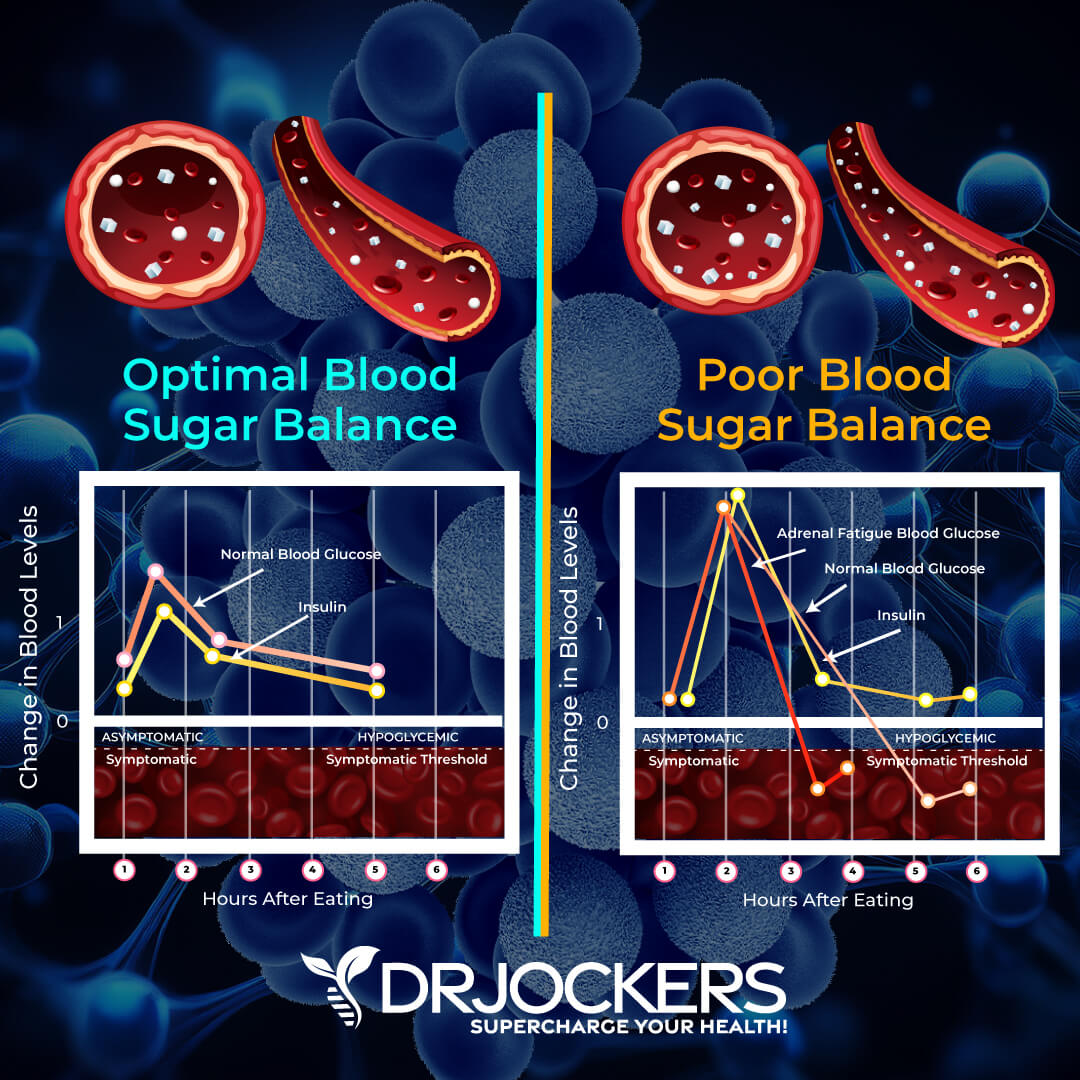
Improve Nasal Breathing
A 1987 study published in the Journal of Laryngology and Otology has found that nasal breathing can improve your sleep (19). Nasal breathing helps to humidifier the air entering your body, improve oxygen circulation, and filter foreign particles. It may also reduce snoring and daytime sleepiness while improving nighttime sleep.
Knowing how you breathe at night can be difficult to know since you are sleeping. If you are dealing with congestion, nasal breathing can also become more difficult. To ensure nasal breathing, I recommend mouth taping with these strips here and using nasal breathing magnets. To reduce congestion and improve nasal breathing, read this article.
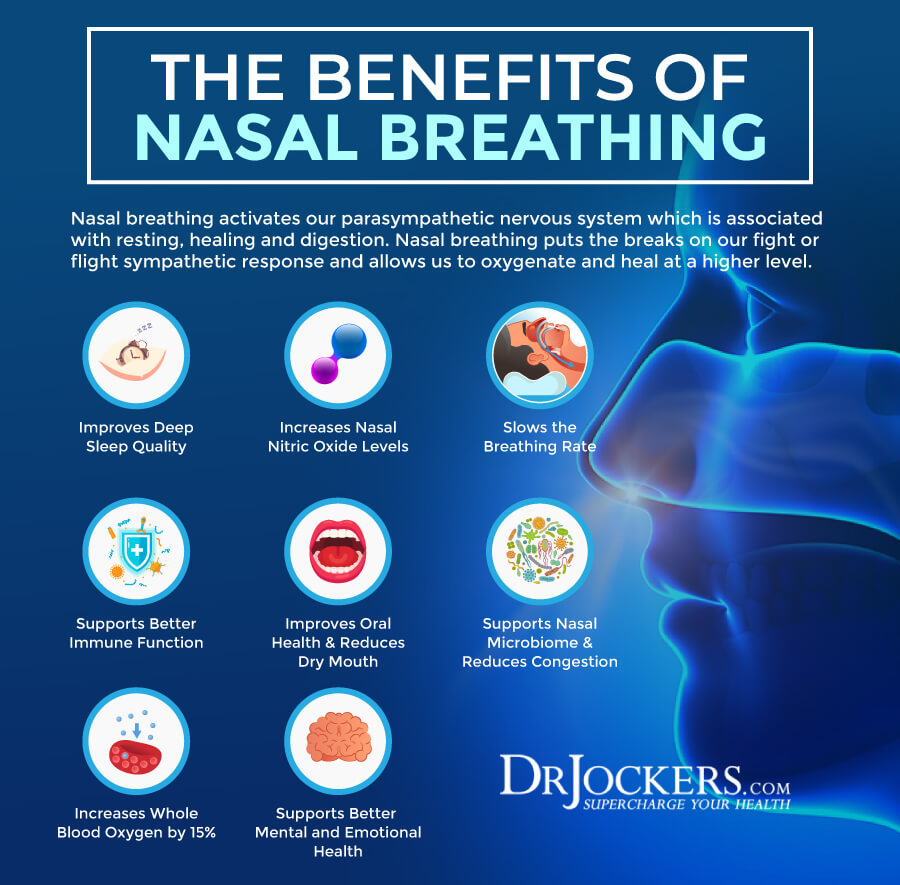
Reduce EMF Exposure
Electric and magnetic fields or EMFs are electromagnetic frequencies that are found everywhere around us. EMFs are also referred to as radiation. EMFs are related to the use of electrical power and various forms of light, including natural and man-made light sources. They are being emitted from the electronics that you love and use daily, including your cell phones, tablets, laptops, WiFi, and so on.
Regular EMF exposure can lead to an array of symptoms and health issues. According to a 2012 study published in the Iranian Journal of Environmental Health Science and Engineering, even low EMF exposure can interfere with sleep quality (20).
I recommend that you reduce your EMF exposure. I recommend using your phone, computer, and other electronics only when necessary, choosing hardwired connections instead of WiFi, turning off your WiFi when not in use, keeping your devices in airplane mode or off when not used, sleeping away from your devices, choosing landlines and face-to-face contact instead of using your cell phone, avoiding BlueTooth devices, and generally reducing your electronic use.
Since completely avoiding EMF exposure is impossible, even if you move off-grid, protecting yourself from EMF exposure is critical. My top recommendation for EMF protection is using the Harmoni Pendant and a Qi Home Cell Device. You can learn more about them by clicking these links.
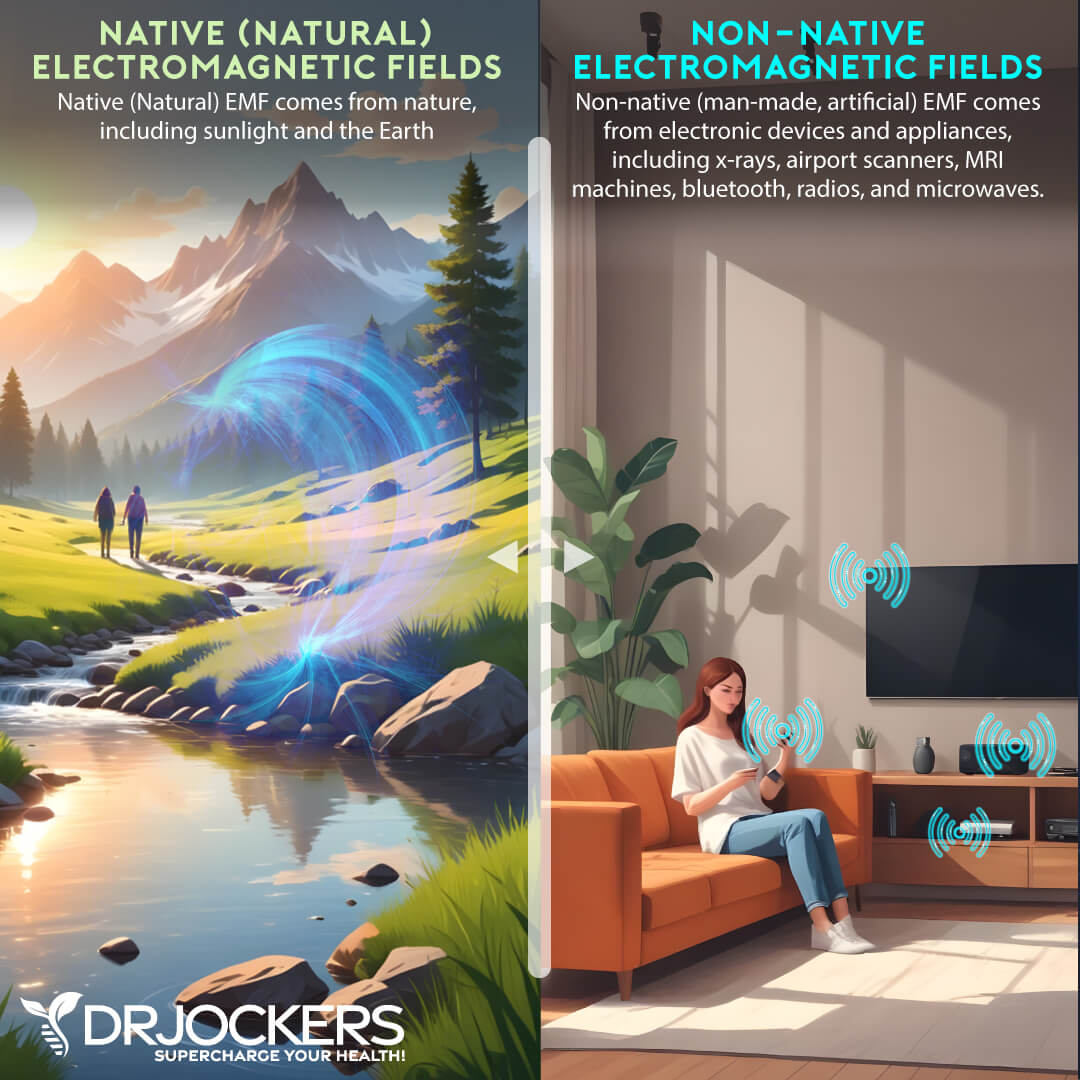
Diffuse Essential Oils
Diffusing essential oils is a great way to relax your mind and body and support your sleep. I particularly recommend lavender and chamomile oils. A 2020 randomized clinical trial published in Complementary Medicine Research has found that lavender oil can help to improve sleep quality and may be beneficial in palliative care (21). A 2006 study published in Taehan Kanho Hakhoe Chi has found that lavender essential oil aromatherapy can be helpful for insomnia and depression (22).
A 2020 randomized controlled trial published in Burns has found that lavender and chamomile oil may help to improve sleep quality and anxiety and may be beneficial for burn victims (23). I recommend diffusing lavender or chamomile oil in the evening to help to calm your mind, relax your body, and improve your sleep.

Optimize Magnesium Levels
Magnesium is an important mineral for muscle relaxation, sleep, mental health, inflammation reduction, exercise performance, healthy blood pressure, and blood sugar levels. A 2012 double-blind placebo-controlled clinical trial published in the Journal of Research in Medical Sciences has found that magnesium can reduce insomnia and support your sleep (24).
Most people are deficient in magnesium and can benefit from supplementation. I recommend using Ancient Minerals Magnesium Lotion with Melatonin and Sleep Deep or Brain Calm Magnesium for better sleep. You may also add some magnesium-rich foods, like greens, avocados, nuts, and seeds, to your diet.
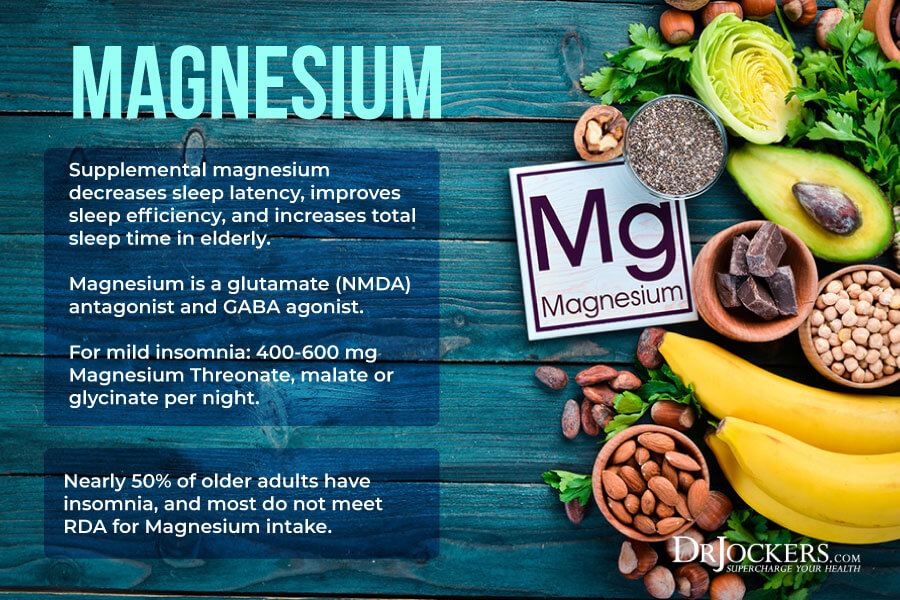
Consider Using Melatonin
Melatonin is a nutrient that helps to support your circadian rhythms and brain detoxification. Research that I discussed earlier suggests that melatonin fights neurotoxins and brain toxicity, helps to inhibit pro-inflammatory cytokines, offers antioxidant support, reduces inflammation, oxidative stress, and infections, and lowers the risk of neurodegeneration (7, 8, 9, 10). According to a 2014 review published in Nutrition Journal, melatonin can help to promote healthy sleep (25).
To improve deep sleep, I recommend supplementing with Sleep Support. It’s a fantastic supplement that supports healthy sleep, pineal gland function, cardiovascular health, and immune function. I also recommend using Ancient Minerals Magnesium Lotion with Melatonin.
Sleep-Improving Herbs
There are a variety of sleep-improving herbs I recommend for better sleep and deep sleep, including valerian root, passionflower, lemon balm, tart cherry, and California poppy extract.
Valerian Root
Valerian root is an herb commonly used for sleeplessness and anxiety. A 2010 meta-analysis of randomized placebo-controlled trials published in Sleep Medicine has found that valerian root may be beneficial for insomnia (26).
A 2020 systematic review and meta-analysis published in the Journal of Evidence Based Integrative Medicine has also found valerian root to be effective for sleep problems (27). You may benefit from supplementing with valerian root.

Passionflower
Passionflower is a medicinal plant used for sleep, anxiety, digestive issues, chronic pain, and muscle cramps. A 2011 randomized-controlled trial published in Phytotherapy Research has found that passionflower tea may help to improve sleep quality (28).
A 2017 study published in Sleep Science has also found that passionflower may benefit sleep (29). You may benefit from supplementing with passionflower.
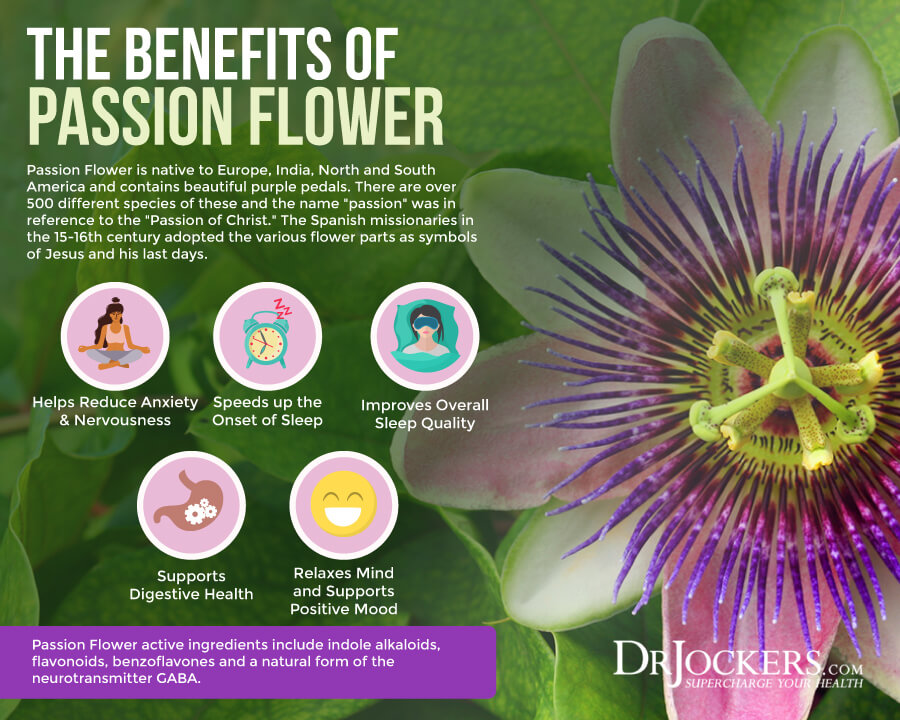
Lemon Balm
Lemon balm is a medicinal herb used for sleep, digestion, anxiety, and depression. According to a 2011 pilot trial published in the Medical Journal on Nutrition and Metabolism, lemon balm may help to improve sleep disturbances and anxiety (30).
According to a 2018 randomized placebo-controlled trial published in Integrative Medicine Research, lemon balms may help with insomnia, anxiety, and depression (31). You may benefit from supplementing with lemon balm.

Tart Cherry
Tart cherry juice offers many benefits, including better sleep, less inflammation, improved blood pressure, decreased muscle soreness, and better endurance. A 2012 randomized-controlled trial published in the European Journal of Nutrition has found that tart cherry juice can improve melatonin levels and sleep (32).
According to a 2018 pilot study published in the American Journal of Therapeutics, tart cherry juice can support insomnia treatment and help improve sleep (33). You may benefit from drinking tart cherry juice or supplementing with tart cherry.
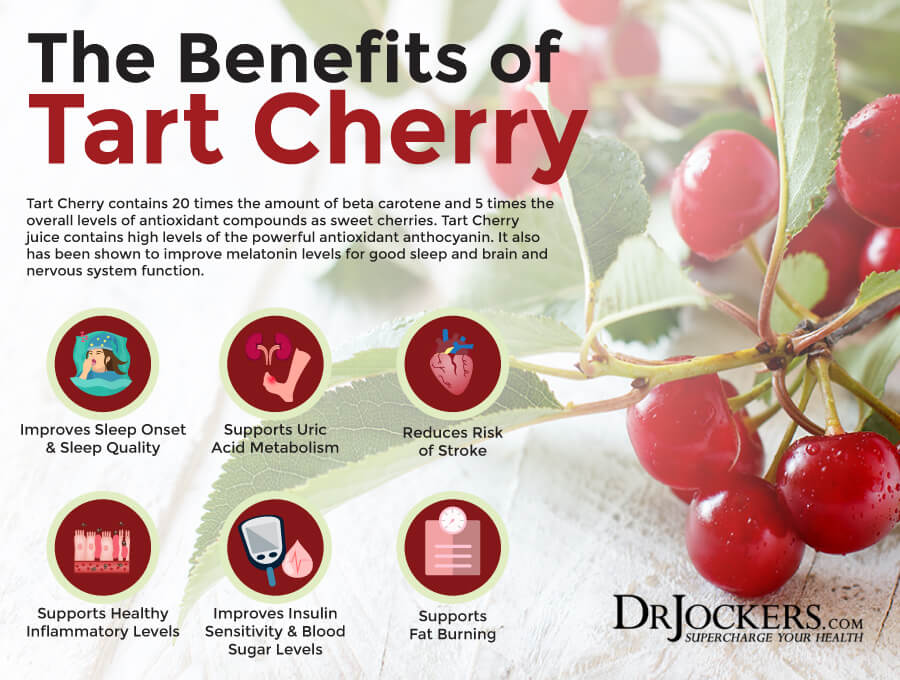
California Poppy Extract
California poppy extract is often used for sleep, nervousness, aches, bladder issues, and liver health in herbal medicine. The alkaloid compounds within this impact and modulate the GABA receptors to support a state of calmness and good sleep.
A 2015 study published in Biochemistry Research International has found that California poppy extract may have sedative effects and brain health benefits (34). You may benefit from supplementing with California poppy extract.

Introducing Sleep Deep:
Sleep Deep provides nutrients associated with neurotransmission and second messenger functions, neuronal stabilization, brain osmotic regulation, and glial cell function. Sleep Deep contains 5 compounds associated with relaxation and deep sleep. Magnesium, myo-Inositol, taurine, GABA and L-theanine.
Magnesium is a key mineral that calms the brain and helps improve feelings of tension and stress. Myo-Inositol, commonly thought of as Vitamin B8, helps to improve blood sugar stability and improves neurotransmitter function to support relaxation and sleep.
Taurine is an amino acid that supports immune health and nervous system function. Taurine helps calm the brain and supports healthy inflammatory balance in the brain. GABA is the main inhibitory neurotransmitter in the brain and helps calm the brain, reducing stress and tension and supporting deep, restorative sleep.
L-theanine is an amino acid that acts as a GABA agonist and improves GABA activity in the brain which supports a calm and restful state and deep, restorative sleep.
Final Thoughts
Deep sleep is a vital sleep stage when your body experiences the slowest brain waves during the night. Deep sleep is critical for waking up refreshed and feeling energized during the day. I recommend that you follow my top natural strategies for improving deep sleep to support your energy, brain detoxification, and overall health and wellness.
If you want to work with a functional health coach, I recommend this article with tips on how to find a great coach. We do offer long-distance functional health coaching programs. For further support with your health goals, just reach out and our fantastic coaches are here to support your journey.
Inflammation Crushing Ebundle
The Inflammation Crushing Ebundle is designed to help you improve your brain, liver, immune system and discover the healing strategies, foods and recipes to burn fat, reduce inflammation and Thrive in Life!
As a doctor of natural medicine, I have spent the past 20 years studying the best healing strategies and worked with hundreds of coaching clients, helping them overcome chronic health conditions and optimize their overall health.
In our Inflammation Crushing Ebundle, I have put together my very best strategies to reduce inflammation and optimize your healing potential. Take a look at what you will get inside these valuable guides below!







HI Dr. Jockers: I read your article with interest and have one additional suggestion. I have experienced the Wholetones sleep mask (Wholetones Serenity Sleep Mask) and sleep machine (Wholetones 2sleep 2nd gen). They really help me sleep soundly because of the embedded frequencies. You might want to include this info in your discussion on sleep. Congrats on the newest member of your family. Babies are such a blessing!
Yes thw Wholetones sleep machine is excellent, we may add that to this article.
Hello Dr J,
Can Melatonin be given to a child (9 year old) on a regular basis? Also, can melatonin, Valerian, Lemon Balm be taken together?
Regards,
Savera
Yes it can and they can be taken together. Melatonin is not at all dangerous and has many great health benefits.
Would a Rebounder be helpful? If so, how long do you need to jump for in order to benefit yourself?
look up Dr melissa gallagher for rebounding for lymphatic drain
I have all kinds of supplements. I started taking yours Brain Calm Magnesium. I do not normally help trouble falling asleep. I normally bedtime is 10:30-11:00 pm. Most nights I wake up suddenly around 1:30 am to 3 Am. Then I will on and off sleep. Used to take ambien for years. Got off it about this time last year. Help
Can you recommend a pillow for good sleep. I sleep on my side and prefer a softer pillow, but want neck support.
Thanks